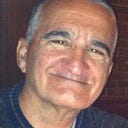Life’s Mystery
I’m not crazy about the so-called positives people are finding in the pandemic, although I realize there are some. That is simply the nature of life and will never change. As for the belief that things will never be the same, I am skeptical, as time has a way of diminishing, if not entirely erasing events even as momentous as 9/11. The lockdown has forced the closing of my little dog and pony show book shop for the foreseeable future, so I need to fill the hours I devoted to it. One of the ways is writing a thriller, a novella, from which I’ve taken a break after working on it every day for six weeks. I’ve also abandoned my 350-page limit on the length of books I choose to read, at least temporarily. This enabled me to take a crack at The Poisonwood Bible by Barbara Kingsolver, who I would guess is at the opposite end of the political spectrum from yours truly. Despite this, as human beings, we share at least a bit of common ground, and it is manifested throughout this brilliant work of art, which was no doubt inspired by the time she spent in Africa as a little girl in the company of her father, a doctor/humanitarian. It works on several levels, as adventure, a tale of survival, historical fiction, political commentary and, above all, a portrait of the overall human condition. The action begins in 1959. A minister takes on the task of bringing Jesus to the Congo, which at the time was primitive, jungle land and all its dangers. Rather than going it alone, he brings his wife and four daughters. The story is told in alternating chapters from the perspective of each female. Rachel, 16 at the start of the narrative, is a typical American teenager. Leah and Adah are high IQ 14-year-old twins, the latter physically handicapped. Ruth Ann is a darling, intrepid six-year-old. Their mother, Orleanna, is a stalwart. Kingsolver renders the personalities masterfully, offering psychological depth even in the case of the fanatical father. I will forgo spoilers. The fates of the characters are for readers to discover. Instead I will offer snippets that hit home: From the mother: “…You can curse the dead or pray for them, but don’t expect them to do a thing for you. They’re far too interested in watching us, to see what in heaven’s name we will do next.” From Leah: “God doesn’t need to punish us. He just grants us a long enough life to punish ourselves.” From Adah: “The death of something living is the price of our own survival, and we pay it again and again…” And: “… All human odes are essentially one. ‘My life: what I stole from history and how I live with it.’” And: “… The power is in the balance: we are our injuries as much as we are our successes.” And: “Poor Africa. No other continent has endured such an unspeakably bizarre combination of foreign thievery and foreign goodwill…” And: “We and our vermin blossomed together out of the same humid soil… and so far no one is winning… appraise ant, human, and virus as equally resourceful beings, you might admire the accord they have all struck in Africa.” I have not quoted Rachel who, despite her occasional butchery of English, demonstrates keen wit, often through references to American pop culture. Would that region have been better off untouched, unvisited by whites? I would guess that’s what the author believes. I am a proponent of modernization, although I know such efforts often go astray and cause much damage. I resist getting into arguments on the evolution of civilization, which seem an exercise in futility. It is what it is and everyone must adapt. Yes, whites did great harm to certain parts of Africa. The situation should have been managed much better. I’ll stop there, as I am not sufficiently versed in the topic. Any admirer of President Eisenhower will be disappointed by his portrayal in the book. I would cut him more slack given the battle taking place at the time between capitalism and communism, although I agree that communism would have been a step up for the Congolese, and that the idea that such poor nations might pose a threat to the USA seems ridiculous in retrospect. The writing and dialogue are solid. Is the novel too long at 500+ pages? I don’t know what might have been cut. Even though my patience was tested by the grown up Leah’s politicking, it was genuine and well-argued. There are many who share her views, so it was not wrong to include them. 3100+ readers at Amazon have rated The Poisonwood Bible, forging to a consensus of 4.5 on a scale of ten. The title refers to a tree whose sap is dangerous, and also to an analogy Adah makes describing her father’s efforts. It is always foolish to predict what works will be considered a masterpiece. If this one isn’t, it’s as close as a novel gets. Published in 1998, it was nominated for a Pulitzer, losing out to The Hours by Michael Cunningham, which I wasn’t crazy about and which owed a lot to the work of Virginia Woolf, lacking the originality of Kingsolver’s epic. She has written seven other novels, a short story collection, two books of essays, a volume of poetry, and three works of non-fiction. She also contributed to the documentary Yarn (2016). 65, a social justice warrior and environmentalist, she lives on a farm in Appalachia.
My Amazon Author page: https://www.amazon.com/Vic-Fortezza/e/B002M4NLJE
FB: https://www.facebook.com/Vic-Fortezza-Author-118397641564801/?fref=ts
Read Vic’s Stories, free: http://fictionaut.com/users/vic-fortezza
